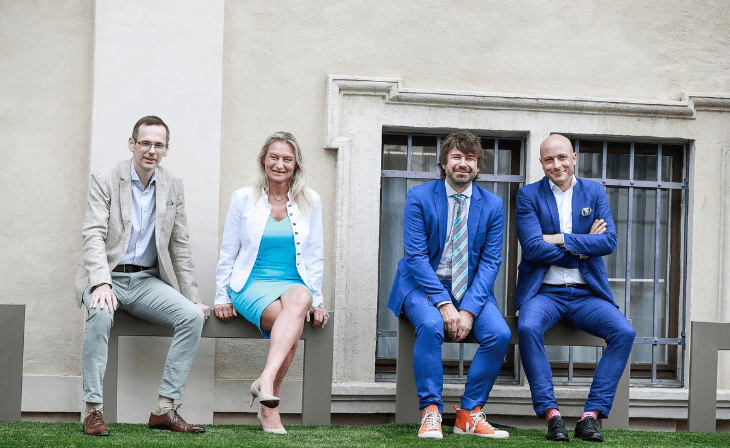Austria’s largest ground-mounted solar thermal plant was ceremonially opened a few days ago in Mürzzuschlag by Ursula While conventional batteries cannot do without critical raw materials, a Graz-based start-up is developing a sustainable electricity storage system: Ecolyte – the young company was developed at Science Park Graz – replaces critical raw materials with residues from bio-based industries. The ground-breaking technology is now being commercialised with almost 4.6 million euros in funding from the European Union together with international partners.
Ecolyte “actually has nothing in common” with a typical start-up, says founder Stefan Spirk. Although you won’t find stereotypical hoodies and ball pools in the young company’s laboratory and offices, Ecolyte certainly doesn’t lack the typical characteristics of a start-up, such as disruptive innovation and agility. Spirk, who also works as a professor at Graz University of Technology, is addressing one of the biggest challenges of the global energy transition with his project to develop a sustainable electricity storage system. He emphasises: “The focus of our project is not just on substituting critical battery raw materials, but on making the battery storage system as a whole more sustainable and environmentally friendly.”
Flavouring as a solution
Ecolyte has found the solution in vanillin: The sweet flavour of the chemical compound not only fulfils its purpose in ice cream, but could also become the key ingredient in the start-up’s redox flow battery. “Like almost all batteries, conventional flow batteries, also known as liquid batteries, use critical raw materials such as vanadium to store energy. We use vanillin as a raw material instead. This not only makes the energy storage system more environmentally friendly, but also more cost-effective,” explains Spirk. Vanillin is already being obtained sustainably from a by-product of the paper industry on an industrial scale. Ecolyte has found a sustainable way to make this compound suitable for use in batteries: “We can convert vanillin into battery raw materials using a simple reaction and also protect it against decomposition,” says Spirk. This refinement process was patented by Graz University of Technology and adopted by the Graz-based start-up. The prototype phase for the bio-based storage system, which is primarily intended for use as a buffer or backup battery in stationary applications, is currently in the final stages. This is intended to demonstrate the fundamental suitability of the storage system and the technology on a larger scale.
“Highest funding amount ever”
The Styrian company is aiming to enter the market by the end of 2024 – also with the help of the European Union. The European Innovation Council – the EU funding channel for ground-breaking technologies in the field of cutting-edge research – is supporting the development from autumn this year with 4.6 million euros. With the help of the funding – and partners such as Graz University of Technology, Montanuniversität Leoben, TU Darmstadt and the Spanish research organisation Biobide – the extent to which artificial intelligence can contribute to improving battery performance will be investigated. The successful funding application was supported by the start-up centre of Steiermärkische Sparkasse.
“We are very proud to be able to support Ecolyte, a pioneering technology company, in its further international expansion,” says Oliver Kröpfl, member of the Management Board of Steiermärkische Sparkasse. Science Park Graz is impressed by the success: “This is the highest amount of funding ever received by a start-up based at Science Park Graz. This recognition confirms the unique approach that Ecolyte is pursuing and shows once again that economic success and ecological sustainability can go hand in hand,” explains Science Park Graz Managing Director Martin Mössler.









